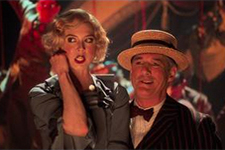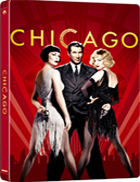Chicago
|  Originally staged in 1975 and successfully revived in 1996, Chicago is probably the most cynical musical to ever hit Broadway. Its wicked combination of sex, media satire, and moral pessimism didn’t play well during the era of Vietnam and Watergate, maybe because it hit a little too close to home. Now, in the era of reality television, 24/7 news coverage of political scandals, and the media oversaturation of circus trials, it seems positively tame, although its sharp jabs at American “justice” and the fickle nature of fame still maintain a relevant bite. Nevertheless, it now plays as almost pure parody, more outright comedy than bitter satire. Set during the blustery heyday of the late ’20s jazz era, which is suggested largely through dark, smoky interiors, rather than lavish exterior shots, Chicago tells the story of Roxie Hart (Renée Zellweger), an apple-cheeked blonde ingénue with dreams of making it big on the stage. Married to a naïve, sad-sack mechanic named Amos (John C. Reilly), Roxie wants nothing more than to be famous. When she finds out the furniture salesman with whom she’s been having an affair lied when he told her knew people who could get her an audition, she responds by shooting him dead. And, guess what? Her dream comes true: She becomes famous, but not in the way she expected. She hires attorney Billy Flynn (Richard Gere), an expensive smooth operator who has never lost a case for a female client and has the ego to prove it. His strategy: Let the trial play out in the media first, so that by the time it gets to the courtroom, it’s already a done deal. Flynn gets Roxie’s picture splashed across the front page of every major newspaper, turning her into a media sensation to the point that housewives are emulating her peroxide flapper haircut. This is the same strategy Flynn is using for Velma Kelly (Catherine Zeta-Jones), a dark and brooding stage queen who is in the slammer for shooting dead her unfaithful boyfriend and her sister, with whom he was cheating. Velma is everything Roxie wants to be: famous—or infamous, as the case may be. But, as these things go, Roxie soon finds herself in the limelight as the next big thing, while Velma is pushed aside as yesterday’s news, which highlights one of Chicago’s most incisive insights: the fleeting nature of fame—how the audience isn’t interested in long-lasting celebrity, but rather in discovering someone new, no matter how superficial. Not surprisingly, Roxie, once a docile little thing, gets a big head, which is always a sure sign that she’s on her way to a downfall. The performers, none of whom had sung or danced on screen before, are all up to the task. Catherine Zeta-Jones, who got her start in chorus lines, clearly relished her vampish role as Velma. Her opening number, “All That Jazz,” is a breathy, ultra-sexy number that establishes her character and the film’s overall tone in one fell swoop. Renée Zellweger demonstrates a nice range in playing Roxie, as she takes the character from a desperate nobody to a hotheaded somebody and back again, without ever completely losing audience sympathy despite her generally loathsome behavior. Richard Gere, who got his start singing and dancing on stage in the ’70s, captures the essence of Billy Flynn, whose signature song “Razzle Dazzle” sums up his approach to his job and life. However, it is Queen Latifah, who plays the tough and corrupt warden in the all-female prison in which Roxie and Velma spend their days, who steals virtually every scene she’s in. Her rousing rendition of “When You’re Good to Mama” in the best number in the film. A movie version of Chicago has floated around Hollywood for a number of years, with no one ever quite being able to nail exactly how to make the transition from stage to screen. Unorthodox in tone and subject matter, a direct translation wouldn’t have suited it, particularly in an era when straight musicals are generally unpopular with audiences. It took choreographer Rob Marshall, who directed the 1999 television version of the musical Annie, to figure it out: Rather than making the musical numbers cinematic, he decided to emphasize their staginess by keeping them on-stage as fantasy sequences in Roxie’s mind. For half the time, Chicago plays like a conventional movie; but, when the music kicks in, it returns to its theatrical roots, with the Bob Fosse-inspired musical numbers taking place on a dark, nearly bare stage bathed in inky hues of red and blue. Visually separating the musical numbers from the rest of the narrative was a slick idea, as it allows Chicago to be two things at once. Not bound by the conventions of the screen, Marshall can indulge his Broadway roots by making the musical numbers as stagy as he wants, which ultimately works to the film’s advantage. As Baz Luhrman knew when he made Moulin Rouge (2001), modern musicals need a hook, something that differentiates them from the big-budget movie musicals like The Sound of Music (1965) that dominated the 1960s. Selling song and dance to an audience raised on MTV was no small feat, even when the story you are telling has all the requisite sex and violence and cynical humor that fuels so much of the modern entertainment machine. Chicago is thus both direly old-fashioned and almost radically postmodern, reinventing the movie musical as a flashy parade of skin and sin interjected into a taut little story about the corrupting power of the media and the willingness of some people do anything—anything—to save their own skin and get famous in the process.
Copyright © 2023 James Kendrick Thoughts? E-mail James Kendrick All images copyright © Paramount Home Entertainment | |||||||||||||||||||||||||||||
Overall Rating: 


 (3.5)
(3.5)


